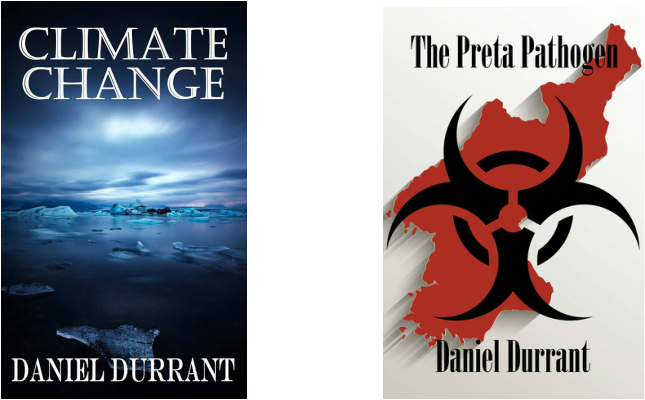
Bio:
Daniel Durrant is a new author writing mainly in the horror and science fiction genres. His short stories have been published in several anthologies in the UK and USA. Daniel lives on the Norfolk coast in England, where he enjoys reading, dog walking, and planning the apocalypse. This is his first novel.The Steampunk novella “Climate Change” has also recently gone into print.
Links:
Facebook: http://www.facebook.com/danieldurrant.theauthor
Twitter: http://twitter.com/DanielDurrant6
1. Where did the idea for the story come from?
There are so many influences it would be tough to list them here! After some success with short stories and a novella, I knew I wanted to write a novel, but had no idea what the subject should be. Around that time I was reading some great zombie fiction, and realised I’d love to try that. Since the genre looked pretty busy, I wanted to write something that would (hopefully) stand out. With that in mind, I gave myself two rules. First, I would try fresh ideas and settings that would break away from the norm. Second, I would work hard to make the concept as realistic as possible. Every aspect of the novel, from the structure to the plot and the virus itself, stems from those two rules.
2. What made me chose North Korea – was the research hard?
The setting was actually one of the first things I decided on. Since no viruses in nature possess the characteristics I required, the “Preta” virus had to be an engineered creation. So the question became: who would have the means and motive to be conducting such dangerous research? I was pondering that when North Korea hit the news for conducting missile tests. It seemed perfect.
I found the research fascinating, so much so that I got distracted by it. As ever, Wikipedia was an important resource. Beyond that, military and international security websites were invaluable. Some of the best information came from sites detailing human rights atrocities – sadly, some aspects of the story are close to factual. I ended up reading far more than I needed to, but hopefully I have done the setting justice.
3. Why is it called the Preta Pathogen – what makes it different from other viruses?
“Preta” is the most common name for the “hungry ghost” of Asian folklore. Traditionally, Eastern religions assert that after death, the spirit of a greedy or selfish person is condemned to wander the Earth, forever hungry. In some versions, the ghost craves human flesh. It seemed a good fit - superstitious North Koreans might blame zombie-style attacks on the supernatural. So the folklore named both my creatures and the virus – which of course, gives the novel it’s title.
The nature of the “Preta” virus itself lies right at the heart of the novel. Whilst the virus does spread via bites, it is not your classic zombie pathogen. Those infected can survive for some time before succumbing to the effects. Even worse, the virus can spread via other means, meaning asymptomatic carriers are constantly spreading the infection (I won’t spoil the plot by revealing how). In the world of the “Preta Pathogen” checking your fellow survivors for bites is not enough – they might be carriers anyway.
4. Two – sides – why write about Ji Tae and Ben?
Strangely, it wasn’t the original plan – Ji Tae’s point of view was meant to last only until the two main arcs of the story converged. However, once Ji Tae was established, I felt she was too strong a character to side-line. You would expect someone that has lived under a military dictatorship to have a very different view of the world; perhaps even a different sense of right and wrong. I found the contrasting perspectives of Ben and Ji Tae a useful way to explore certain ideas. The setting is an important part of the novel, and I found that was best illustrated from Ji Tae’s point of view. Also, there is room for Ji Tae to be a bit of an anti-hero; she has done some very bad things. That made her particularly enjoyable to write.
5. Was it difficult to match up the intrigue, setting etc?
I’d aimed to make the novel more expansive than is perhaps normal in the genre, so having chosen an interesting setting, it seemed rather wasteful not to make use of it. I felt the paranoid nature of the North Korean state made for a marvellous backdrop. So whilst the novel is certainly horror, it’s told in more of a thriller style, and incorporates a story line that reflects the real tensions on the Korean peninsula. As an extension of that, I wanted to anchor the story in the real world, which is illustrated via the regular BBC World News excerpts. That element also created a contrast I really liked - the main characters know exactly what is happening locally, but remain unaware of the greater effects. Conversely, the outside world is seeing all of the effects, but is completely unaware of the cause.
6. What makes it different?
If I’ve done my job properly, “The Preta Pathogen” should feel different from the genre norm for several reasons, but I would say realism is the most important one. All the way through the research and writing, my mantra was, “is this credible?” Although my virus is (thankfully) fictional, the key elements are grounded in real science. Likewise, I wanted there to be a solid reason for everything that happens – a key aim was that the events of the novel should feel like something you might see unfolding on the news. Before writing “The Preta Pathogen” I read (and loved) many zombie novels, but often wondered why most shied away from really explaining the virus, or detailing precisely how it has spread across the globe. Having now done so, I know why - it is extremely hard to write a believable scenario! But I got immense satisfaction from the process, and I hope readers will really enjoy that aspect.
7. Could it really happen?
Sorry to disappoint any zombie preppers out there, but no, it couldn’t. I did a huge amount of research on the medical / genetic / viral aspects of the novel in order to ma As a result, I’m confident that I’ve pushed a zombie-esque virus closer to plausibility than ever, but no, it still requires a considerable amount of scientific and mathematical “adjustment” in order to work. I would say let’s be happy to suspend disbelief and enjoy it for what I hope it is: a good story. On the other hand, any good zombie story should make you want to keep a blunt instrument handy; it’s part of the appeal. So if a reader feels compelled to stock up on MRE’s and .223 NATO rounds, that’s up to them.
8. What’s in the works?
I am currently writing the sequel, which picks up the story a few months after the events of “The Preta Pathogen” (although the novel can be read on a standalone basis, it was always intended as the first part of a trilogy). In the sequel, “Preta” outbreaks have hit several countries, and governments across the globe are struggling to contain the virus. Even worse, Ben and his fellow survivors find that not everyone wants to stop it.

 RSS Feed
RSS Feed
